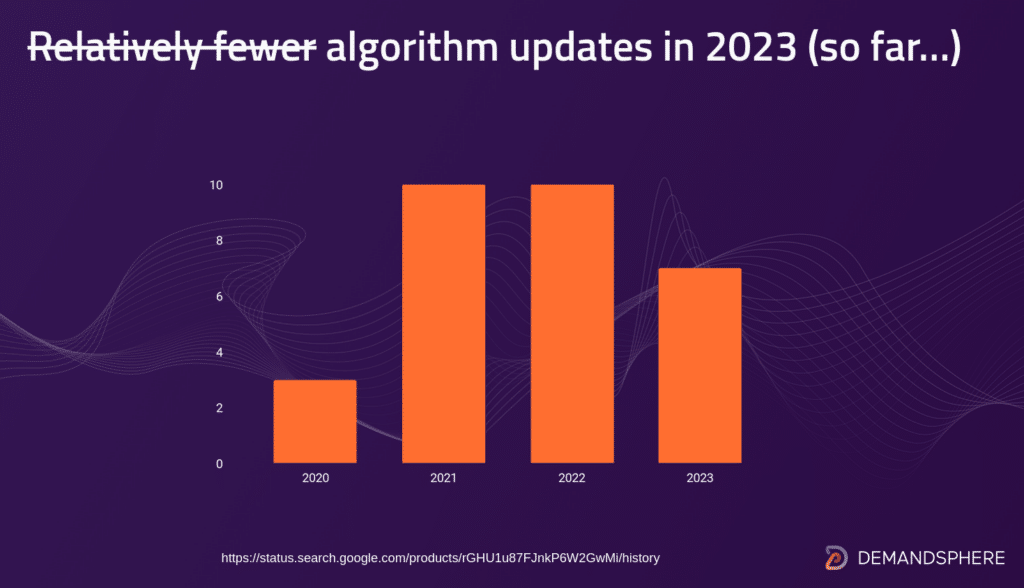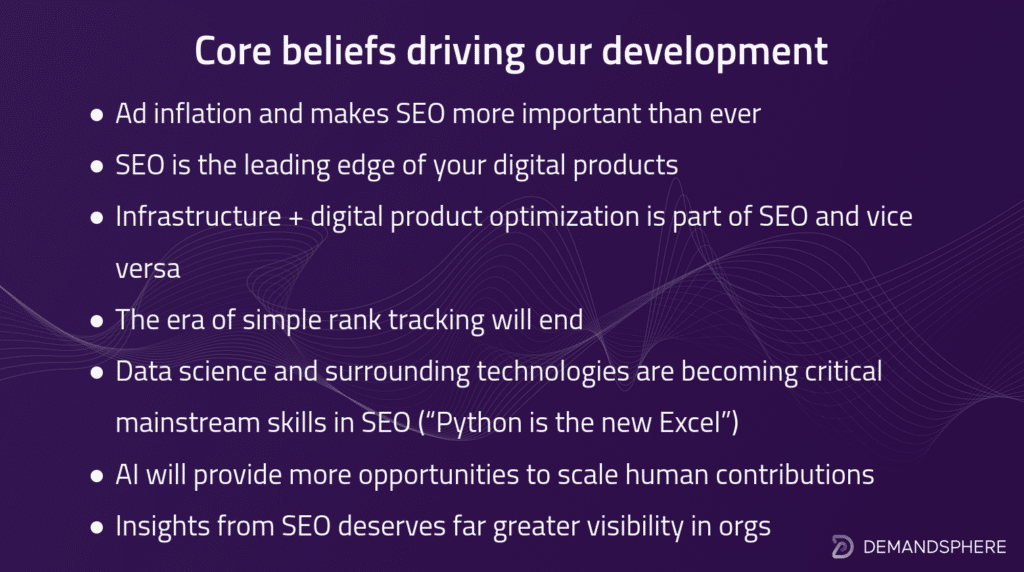The last month has gone by in a flash.
Early in September, I flew to Tokyo to meet with many of our amazing customers.
We also hosted our FOUND Conference again, for the first time since 2019. We plan to do this a lot more going forward, now that people are comfortable meeting in-person again.
The event went very well. We were able to see many friends, partners, and customers that we hadn’t had a chance to connect with recently. Watanabe-San’s presentation was very interesting, as always.
I covered a few core themes, and I’ll share some of the key slides from my presentation here.
First is kind of an amusing one, because in the month since I presented this, we’ve had THREE major updates from Google, almost doubling the amount for this year.
My original slide:

As it would look today:

And I have a feeling that we will be at least on par with the last two years of updates by the end of 2023, if not more.
My point with this slide was to note that not all changes in the Google ecosystem and SEO in general are directly related to algorithm changes and updates. This has been particularly true in the last 12 months.
In addition to algorithm / ranking system updates, we’ve seen:
- the rollout of Google’s AI strategy across many of their key products (SGE, Bard, PaLM APIs, Vertex AI, Workspace integration, infrastructure, startup initiatives, and more)
- obvious a huge number of innovations from OpenAI, most notably being the ongoing releases of ChatGPT, other other products
- a tangible increase in the AI hype cycle
- a TON of changes to SERP layouts and features
- the increasing importance of data science (formalized) in SEO and supporting tools, including Python, BigQuery, Python in Excel, etc. Our SERP Intelligence product is targeted directly at this trend.
I also did a pretty deep dive on Google SGE. The timing was good here because just the week prior, Google launched SGE (in Search Labs only, of course) in Japan. This came much sooner than I had expected.
I walked through a lot of specific examples across travel, automotive, ecommerce.
From an SEO perspective, the main thing we focus on is pixel depth and whether the SGE widget (along with other SERP Features, of course) drive the top 3 organic ranking spots below the fold. The reason for this, of course, is your click through rate (CTR).
How deeply your CTR is affected by the pixel depth of the top 3 rankings and your rankings as well depends quite a bit on your specific industry and niche (as we often note using GSC data in custom CTR models that we build for clients).
So, when looking at SGE, it helps to know 1) is the SGE widget present and 2) on what type of queries does it auto-expand?
The non-expanded / collapse SGE widget doesn’t take up much pixel space but the expanded one, in many cases, can take up the entire first fold.
In order to analyze this more comprehensively, we built a research scraper to measure a batch of keywords and were able to summarize the results in the following slide:

The big takeaway here is that SGE appears for 81% of the queries that we tested.
More importantly though, it auto-expands for almost half (44% to be exact) of these queries.
It’s been a few weeks since we’ve conducted this research and we’re in the process of expanding this list further for a second batch of research.
Keep in mind that these results are likely heavily customized and also undergoing a lot of product development by Google so these won’t represent conclusive numbers. However, because the only way to see these results right now is through a logged in Google account, it’s the best we can do.
I also speculated on how Google and SGE could potentially interact with sites less on the content side and even more on the structured data side of things. I believe that Google has large incentives to do this, and I went into a good level of detail on this during my talk but I’ll stop there for now on this topic.
I also announced a new offering that we have built, called ProseVector.
Right now it’s delivered primarily as a Managed Service because we don’t have a UI for it, but it’s an automated process to create / generate very high quality content for ecommerce and programmatic sites.
Technically speaking, it would fall under the category of a Retrieval Augmented Generation (RAG) product, which is one of the more interesting applications of LLM products and APIs (in our opinion).
This product allows us to take low-quality or missing content on Product Listing Pages (PLPs) / Product Description Pages (PDPs) and create quality, optimized content for pennies on the dollar at virtually any scale. We think it’s a game-changer and will continue to share more as we have updates.
I ended with a slide that re-iterated the values we follow as we approach our product development:

These are the core beliefs that we think separate us from other providers and we do our best to ensure that our solutions reflect these values.
Overall, we got a lot of great feedback and we look forward to future events.
After I left Tokyo, I flew to London the next week to meet with clients and also to attend brightonSEO for the first time. This event is the nexus of the SEO world right now. We had so many positive conversations and made so many great connections, that this is an event we will be participating in going forward.
In fact, I will be speaking at the first US (I think it’s the first?) edition of brightonSEO, in San Diego. I lived in San Diego from 2003-2008, and I’m looking forward to being there again.
My presentation is titled “Measure the whole SERP at any scale.”
This talk will be an expansion on the theme that we have been evangelizing very heavily at DemandSphere. Namely, the era of traditional rank tracking is over. Instead, it is critical to measure and monitor the entire SERP as a whole and do so at a level of scale and relevance that can inform not only SEO strategy but also the strategies of executive, product, and performance marketing teams.
If you’re going to be there, shoot me a note or connect with me on LinkedIn. I’d love to chat.

